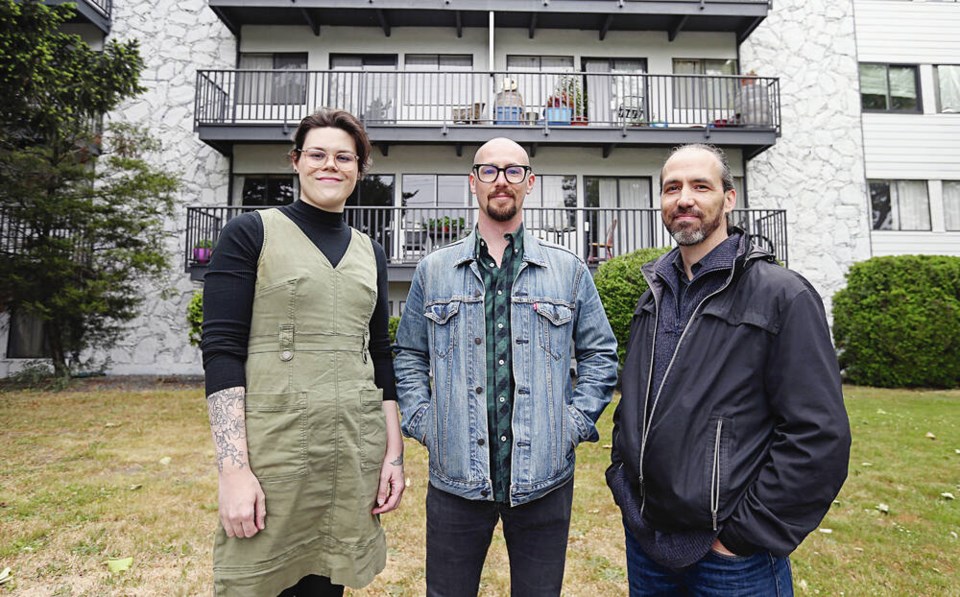Victoria tenants unite to fight rising rents
Less than 10 years ago, Harland Bird was renting an apartment near Victoria City Hall for $450 a month, heat and hot water included — by himself.
“It’s laughable now to think about something like that,” he said. “Clearly, something has changed.”
When the house where he was renting was sold, Bird struggled to find something else. “I could not find a place to live. I moved into three [short-term] places in two months, and had to keep moving because I couldn’t find anywhere else.”
With no other options, Bird now lives with his partner’s family. “While I got lucky, a lot of people out there are not,” he said. “Something has to be done.”
Bird is a founding member of the Victoria Tenants Union, which was formed this May in hopes of giving renters similar bargaining rights to workers. Where a workers’ union would withhold labour as a last resort, a tenants’ union would withhold rent payments.
Tenants’ unions are a trend seen in other cities in the face of ever-rising rents, with tenants hoping they will have more power as a group than as individuals.
“Just like [how] workers negotiating with their bosses individually doesn’t tend to work out, tenants negotiating with their landlords individually often doesn’t tend to work out,” Bird said.
“We need tenants’ unions to help protect against abuses or potential abuses by landlords, just like we need labour unions to protect against potential abuses by the bosses who would still probably have us all working 12, 14, 16 hour days if it wasn’t for unions.”
Recent findings from the Canadian Rental Housing Index national database found that 16 per cent of households in the capital region are paying more than 50 per cent of their gross earnings on rent and utilities.
The report also found the average rent in B.C. increased by 30 per cent from 2016 to 2021, the largest increase of any province.
“There’s a fundamental imbalance in this city,” said Pierce Nettling, another founding member. “A lot of people in this town are seniors. They’re on fixed incomes and pensions. There’s only so much of a budget that they can make before we start displacing them.”
The resulting housing pressures from increased rents radiates out from Victoria and causes increased pressure in markets elsewhere on Vancouver Island, he said.
The Victoria Tenants Union wants tenants to be able to stay in the capital region, and to be better informed about their tenancy rights.
“We’re like a team for everyone,” Nettling said. “If you live in a trailer park, if you live in a building, if you live in a basement suite, we want to hear from you.”
One of the union’s long-term goals is to achieve tenant collective bargaining rights, which could mean that landlords would have to follow rent standards pre-negotiated with the building’s tenant association instead of setting prices for individual renters.
Nettling said tenants need collective-bargaining rights due to the increasing investor ownership of housing, particularly by real estate investment trusts or REITs — companies that own and often operate rentals.
The fight for tenants’ collective-bargaining rights in Canada stretches back to the 1860s, when tenant farmers on Prince Edward Island formed a union and went on a rent strike against absentee farmers.
In the late 1960s and 1970s, a wave of Vancouver-based tenant unions fought landlords on rent increases and campaigned for increased tenant rights.
The NDP promised tenant collective bargaining rights in 1972 but did not implement it after they were elected to power.
More recently in 2018, tenants in a west Toronto highrise successfully quashed a proposed 3.4 per cent rent increase from their property management company with a two-month rent strike.
Today, hundreds of tenants in two separate Toronto building complexes are currently on rent strike, withholding rent from corporate landlords such as Dream Unlimited and Starlight Investments in the face of higher-than-normal rent increases. Ontario only allows rent increases of 2.5% a year to account for inflation, though landlords can apply for another three per cent.
Bryan Jacobs, an organizer with Rent Strike Bargain, a tenant advocacy campaign that is closely associated with the Victoria Tenants Union, cautioned that B.C. tenants looking to implement rent strikes should be aware that it is much easier to evict someone in B.C. for withholding rent compared to in Ontario, where a landlord has to apply for an eviction notice.
“In B.C. they just download a form off the website and they can start eviction proceedings without approval of the [tenancy] board.”
Tenant unions can still bargain for better maintenance, pet policies or installations of amenities like a laundry room at the bargaining table without resorting to more militant strategies, he said, adding landlords and tenants have some common interests and there is space for good faith negotiations.
“Landlords are trying to get profit. But to get profit, they need to make sure that the housing is as good as it can be,” Jacobs said. “We’re not actively calling on tenants to strike, because that is so dangerous.”
For now, the Victoria Tenants Union is simply talking to renters, hearing their concerns and laying the groundwork for something bigger.
Founding member Kyle Sarrasin said most people have been appreciative of their outreach efforts.
“If we’re in touch with people — if we’re getting them to be in touch with each other within their own spaces, there will be more room for mutual aid, mutual support,” he said. “In large part, it’s about building community.”
mjlo@timescolonist.com
>>> To comment on this article, write a letter to the editor: letters@timescolonist.com

No comments:
Post a Comment